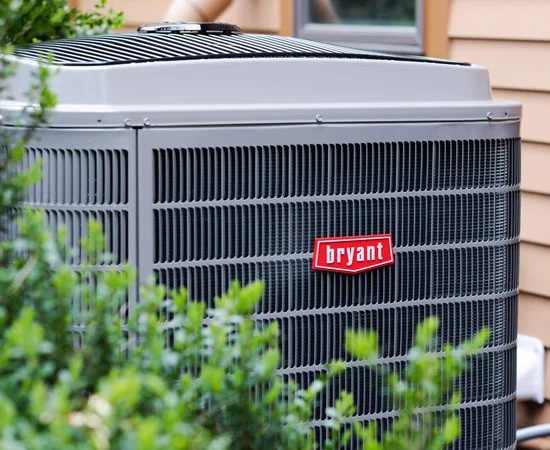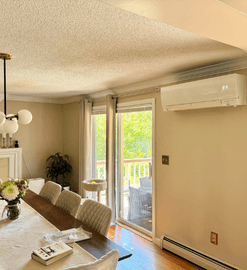Summer heat in Massachusetts can arrive quickly, and when it does, it’s important to have a reliable cooling solution in place. Whether you’re upgrading an existing system or installing a new one, choosing the right HVAC system makes a big difference in keeping your home comfortable.
To help with your decision, we’ve outlined comparisons of different cooling solutions Massachusetts homeowners can explore based on their home’s design and needs.
Here are six easy tips to prepare your home for the cooler months ahead:
When most homeowners think of central air conditioning, traditional central AC is often the first system that comes to mind. Central air conditioners use a network of ducts to distribute cool air throughout your home. These systems typically consist of an outdoor unit (the condenser) and an indoor unit, which can be your home’s existing furnace or a separate air handler.
Central heat pumps are another great way to use ductwork to cool your home. Heat pumps are becoming increasingly popular for their energy efficiency, quiet operation and ability to provide both heating and cooling. Though heat pumps are most often thought of in terms of heating, these efficient systems are a great solution for central cooling and can easily replace your home’s existing central AC system.

Unlike central air conditioners, which have a fixed-speed compressor, heat pumps use inverter technology to adjust the compressor speed to meet the home’s specific cooling needs. This means heat pumps run continuously at varying speeds, offering quieter operation and better energy efficiency.
Price: On their own, central AC systems can be slightly less expensive than central heat pumps. However, in Massachusetts, energy incentives like the Mass Save program and local municipal rebates can help offset the cost of heat pump installations, often making them more affordable than traditional air conditioning when factoring in rebates and 0% financing options.
Efficiency: Heat pumps are generally more energy-efficient than central ACs because they operate at varying speeds, unlike most central AC systems, which run at a fixed speed. The ability to adjust to demand allows heat pumps to maintain stable temperatures and reduces energy waste. Fixed-speed ACs on the other hand, often use more energy to “catch up” when they cycle on and off.
Functionality: Central heat pumps offer greater versatility by providing both heating and cooling. This dual functionality is especially beneficial in Massachusetts’ shoulder seasons, when using traditional heating systems can be expensive. A heat pump can efficiently heat your home during the colder months, offering a cost-effective year-round solution.
* For more detailed information on the cooling capabilities of central heat pumps, read here.
In many Massachusetts homes, lack of existing ductwork is the primary barrier to enjoying whole-home air conditioning. Thankfully, there are several options for cooling homes without ductwork.
If you’re looking for a budget-friendly cooling solution, window air conditioners are a common choice for homes without centralized air. While their up-front cost is more affordable, they come with several limitations, including lower energy efficiency and noisy operation. Window units also obstruct natural light and limit window use, which can be a hassle (and potential security issue), especially during Massachusetts’ shoulder seasons.
Ductless mini-split heat pumps are an ideal solution for homes without existing ductwork, or for one-off rooms such as new additions, she-sheds and garages. These systems offer efficient cooling and heating with quiet operation and can be installed in one room or throughout the entire home. Each indoor unit connects to an outdoor condenser, allowing for room-by-room temperature control.

Mini-split systems are energy-efficient and often eligible for local rebates through programs like Mass Save and municipal incentives. They also come in various styles to match your home’s aesthetic, including wall-mounted, floor-mounted and ceiling cassette options.
For homeowners in Massachusetts who want centralized cooling but lack existing ductwork, installing ductwork paired with a central HVAC system may be a viable option. While this route is often more expensive due to the complicated design and installation process, adding ductwork provides a long-term, seamless solution for both cooling and heating.
Price: Adding ductwork and a central system is typically the most expensive option but may be the best choice for larger homes or those with specific aesthetic and long-term goals. While window AC units have a lower upfront cost, they are less efficient than mini-splits. Additionally, your mini-split heat pump project may qualify for energy incentives through local programs such as Mass Save.
Efficiency: Mini-splits are highly efficient, as they avoid energy loss from duct leakage and the gaps that often occur with window AC units. They are also a zoned solution, allowing you to cool only the rooms you use most and adjust temperatures as needed.
Functionality: Compared to window AC units, mini-splits offer more functionality by providing both heating and cooling, plus “dry” modes to combat summer humidity. Window AC units are limited to cooling and require a cumbersome setup process.
* For a detailed comparison between window air conditioners and mini-splits, check out our blog post here.
Choosing the right air conditioning system for your Massachusetts home involves weighing factors such as price, efficiency and functionality. It’s important to work with a credible contractor experienced in designing and installing a variety of cooling systems (Like Jay Moody HVAC).
A knowledgeable contractor will assess your home’s unique needs, help you navigate available energy incentives and ensure proper installation for long-term comfort and efficiency.
Explore cooling options for your home, schedule your free quote today!
Whether you’re looking for reliable HVAC, electrical or plumbing services,
we’re here to help!
"*" indicates required fields